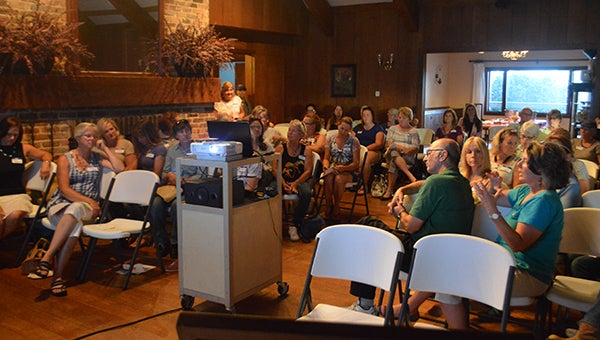Community, equine groups gather to discuss prevention of horse slaughter
Published 10:00 pm Thursday, July 14, 2016

Community members and representatives from equestrian groups from across North and South Carolina met at FENCE Wednesday evening to discuss the prevention of horse slaughter. Legislation, microchipping and ways for the community to get involved and volunteer for local equestrian organizations were topics of discussion. (Photo by Michael O’Hearn)
More than 50 community members and representatives of equestrian groups from around the area gathered at FENCE Wednesday night to talk about the prevention of horse slaughter.
The ad hoc meeting was sponsored by Partnership with Horses, a local organization created to advocate for the protection of horses. Donations could be made to Foothills Equine Rescue Association in the front lobby of the FENCE Center.
Diane Balding, a member of Partnership with Horses and a retired veterinarian, began the meeting with a PowerPoint entitled “How Can We As a Community Help Unwanted Horses?”
Trending
“Over 100,000 horses are shipped to slaughter annually,” Balding said. “According to Dr. Temple Grandin of the U.S. Department of Agriculture, 92.3 percent of these horses that are shipped to slaughter are healthy. This is not just a national problem, but a problem local to the community, too.”
In the presentation, Balding outlined the need to reduce the number of unwanted horses and, furthermore, the number of horses being shipped to slaughter.
“Many rescues are overwhelmed with the number of horses they receive in their care and have to turn away horses in need,” Balding explained at the meeting. “There needs to be a network with existing rescue groups to place horses or we can form our rescue. Education, most of all, is going to help prevent horse slaughter.”
At the close of the PowerPoint presentation, Balding invited people to stand up and share what local equestrian groups are doing in support of this cause.
Patti Lovelace of Integrated Veterinary Healing and FERA took the stage first to address the crowd, saying there are multiple ways people could help the organization.
“I’ll be passing out volunteer sheets to get people to sign up to help out,” Lovelace said. “Volunteers can offer hay pledges, foster horse homes, property to bury horses, hauling services for euthanasia or even elbow grease and their time.”
Trending
Microchips were also brought up at the meeting. According to Balding, the Equine Rescue Network partnered with an organization known as Microchip ID Equine to track down horses being sold for slaughter.
“There is a 24-hour hotline to call if a horse registered in the system is bound and headed for slaughter or found at an auction,” Balding said. “They will even provide funds to have the horse temporarily moved out of harm’s way. Microchips lead to accountability.”
Legislation against the slaughtering of horses and the exportation of horses for consumption was also brought up including the Safeguard American Food Exports (SAFE) Act. According to North Carolina State Director Erica Geppi with the Humane Society of the United States, this act has been introduced and reintroduced in the past in both the House and the Senate several times.
“This bill, known as the H1942 bill, would essentially cut off funding for slaughterhouses and outlaw slaughter in the country,” Geppi explained. “I know Rep. Trey Gowdy (R-SC) is for it here in South Carolina, but Rep. Patrick McHenry in North Carolina is against it. It is still in committee and the current version of the bill has an expiration date of December 31, and it doesn’t seem to be going anywhere any time soon.”
Balding and Geppi explained the SAFE Act as providing a safeguard against the consumption of horse meat, especially meat that has been injected with chemicals. If no action is taken on the SAFE Act by December 31, the bill will have to be officially reintroduced in the House and Senate.
Other equestrian group representatives who spoke included Whitney Wright from Hope for Horses out of Leicester, N.C. and Tracy Stevens from Bolero Gaiting Horse Adoption Network.
The meeting concluded with the request from Balding and the Partnership with Horses for ideas as a community to develop an action plan. Attendees suggested media ad campaigns and a peaceful protest march on Columbia, S.C.
A Facebook group for the Partnership with Horses will announce the date and location of the organization’s next ad hoc meeting.





